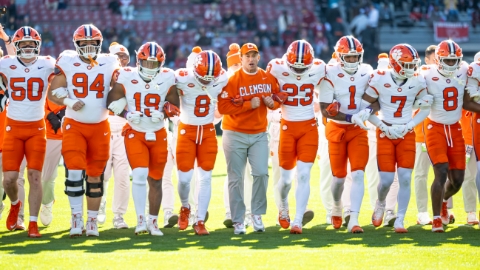
The latest issue to arise in the ‘play or not to play’ CFB saga of 2020 is the issue of Myocarditis caused by COVID-19. To learn more about Myocarditis and its impact on coronavirus patients, we talked with Dr. Jeff Travis, a cardiovascular surgeon at the Lexington Medical Center Heart and Vascular Center.
Full transcript from our interview with Dr. Jeff Travis
Lawton Swann: Myocarditis. It's a phrase we've heard quite a bit from the sports perspective over the past week or so, in your line of work. You're very familiar with this. What exactly for our listeners is myocarditis?
Dr. Jeff Travis: "So myocarditis is just an inflammatory condition of the heart. Anytime you add -itis to the end of the word like tendinitis, it just means inflammation. A good way to think about inflammation is if you think about your thumb, if it got hit by a hammer, it swells. That's the body's natural response to any type of injury-- is that it swells. Cells come into the area to try to repair that damage. Fluid comes into that area. That's what causes the swelling as the body tries to fix whatever went wrong. When it happens in the heart, myocarditis can be [caused by] bacteria, but in this case, virus can cause damage to the heart cells. The body comes in and tries to clean that up and that causes an inflammatory reaction in the heart that really does more damage than the actual virus does to the heart. The virus just attaches there and tries to replicate. But it's the body's response to that virus that can do damage to those cells. And so as time goes forward, can be months, can be years, those cells can suffer damage, and then not function as well."
Lawton Swann: In sports, when we see athletes dying tragically at young ages and you find out they had an enlarged heart or something like that is myocarditis often found to be sort of a catalyst to that?
Dr. Jeff Travis: "Most of the time when you have that sudden cardiac death in a young athlete is due to a congenital condition, they had hypertrophy of the heart in some way that they were born with and just was undiagnosed until they got into a very vigorous situation. So that is the majority of those patients. It can be myocarditis presenting light, but that's pretty unusual. Myocarditis overall is pretty rare.”
Lawton Swann: When I think about what we're hearing right now, from the standpoint of sports, it's that concerns about myocarditis might be what's led the Big Ten and the Pac-12 to cancel their seasons. We don't know that for sure, but would myocarditis, in your opinion be something that would be a legitimate reason to, to shut down the college football season?
Dr. Jeff Travis: "I think I would have a hard time at this point. I don't think there's enough evidence to suggest that. I think this pandemic has been going on in the United States for about four months now. And we really haven't seen a large number of patients that have developed myocarditis. They developed a lot of other things and obviously, pulmonary being the main one, respiratory problems, but we haven't seen a lot of myocarditis. I would expect as time goes forward, and even with young athletes, it would be a rare condition.”
Dr. Jeff Travis: “Certainly a concern, a lot of unknowns. We don't know what the true rate would be. But if you just look back at what we've seen the last four months, we haven't seen a lot of myocarditis in patients. We've had a lot of patients in the United States, almost 5 million now that have had this disease [COVID-19] and it has not been widely reported. I don't think it would be more prevalent in a young athlete than it would be in a general population, I think it would be less prevalent. But again, I think that officials when they're dealing with unknowns, sometimes err on the side of safety. That's probably not a bad thing, but I don't think it's really a reason to stop things at this point."
Lawton Swann: Now, when we talk about preventative medicine and things of that nature, even looking at Clemson, I mean, is myocarditis is something where if you have the proper equipment, can you mitigate it? Can you know, early on that somebody is developing it?
Dr. Jeff Travis: "It presents late. So you might get the virus and then three months later, six months later, the myocarditis might show up. It's actually a fairly difficult thing to diagnose in the most effective way to diagnosis it is with an MRI. So you can imagine that's very costly and difficult. If you have to do an MRI on every single patient that gets it. So if every Clemson player that got this, you had to do an MRI on them, it would be very difficult as a screening tool. And again, the timeframe when to do that test would be difficult.”
Dr. Jeff Travis: “There's no real treatment for it other than treating the symptoms like we normally treat heart failure with blood pressure medicines and Lasix and fluid pills, those type things. Again, it usually presents pretty late, it's fairly difficult to diagnose. So you might not know you have it immediately, it might come up down the road. I think that's why people were being cautious with some of these young athletes because it might be a year from now somebody shows up to the combine, all of a sudden they're 40 time is worse and you think, Well, why is that? Why can't they still run faster jump as high? That's a potential downside to it. It won't present until much later down the road."
Lawton Swann: You mentioned that you can get it from COVID-19. But you can get this from any virus, right? Is any virus capable of causing this issue?
Dr. Jeff Travis: "It is just about all the viruses have been associated with it. The intro viruses that we get kind of gi distress are the most common cause that cause myocarditis, bacteria can cause this problem. Again, it's more of a body's response to the damage that the virus or bacteria do in the heart that causes the long term problem with myocarditis. And so yes, anything that sets off that cascade where inflammation starts and swelling in the cells that come in and normally clean up that inflammation, anything that starts that cascade can cause this so there are numerous viruses and bacteria that can cause myocarditis, not just COVID."
Lawton Swann: If you had COVID-19 is your doctor gonna say to you that you need to be aware of the symptoms, because it could lead to myocarditis or how would that work?
Dr. Jeff Travis: “The symptoms would be just similar symptoms to congestive heart failure, you might have some swelling at your ankles, some shortness of breath. So again, it has not been reported widely, even worldwide with COVID-19. So I don't think it's something that people as we see these folks back in the office now, and we see plenty of them that have had COVID and recovered, it's not a prominent thing that we delve into. There's not a great screening test. It's not like an EKG that can be obtained very quickly. So short of any symptoms, which are just symptoms of the heart not working well, which is shortness of breath, leg swelling, feeling tired, there's not a great screening test or way to kind of ferret this out for folks unless they start having those symptoms.”
Lawton Swann: It's unique that you say this, because if you think about it being something that you can get from virtually any virus you mentioned stomach viruses and things of that nature that could even cause it, that the correlation between myocarditis is in COVID-19 would be the reason not to play college football. I mean, if you could get it from a stomach bug, wouldn't we have never played college football? Are you following my logic on that front?
Dr. Jeff Travis: "I am, I am following your logic. I think a lot of it's just the unknown. That is one of the difficult parts with myocarditis is it shows up so much after the infection, even when you go in and do a biopsy of the heart, when somebody presents with this, you don't really see the virus. You can't culture it or know that it was there. You just know that three months ago, they had this illness, six months ago, they had fever and cough and we're in the bed for three nights, that's how we diagnose those other viruses now, in other words, we don't, it doesn't happen right away. And so, again, I don't disagree with your premise, perhaps it’s not a reason to stop because you can get myocarditis from any virus that's readily available in our environment, because they're all out there."
Lawton Swann: When we look at the landscape of college football right now three Power Five teams remain. I know you follow the sport, do you expect that the ACC, SEC and the Big 12 will ultimately go the way of the Big Ten and the Pac-12 and hang it up?
Dr. Jeff Travis: "I don't think they will before the season starts. I think that everybody's going to be somewhat in a bubble and I think we'll make it to season start. Whether or not the season finishes, I don't think anybody can predict. 2020 has just been too crazy to predict anything happening the way you think it might. For that reason, I think they'll get to the season start, and what happens after that, I'm not sure.”
Dr. Jeff Travis: “I'm a little surprised that the other two conferences, canceled their season. I felt like these kids are in a safe place. They have great medical care. They have a lot of protocols in place and it's safe for our kids to go back to college. I have two that are headed back to Clemson tomorrow. I think they're [the student-athletes] probably even safer if they remained in their kind of cocoons. They're not totally in a bubble, like the NBA, but they're very well watched and is very well regulated. I think it was probably the best place for them. So I definitely think the three conferences will make it to start whether or not they finish. I have no idea. I hope they do."
Lawton Swann: Do we even know what percentage of people who get COVID-19? I think you mentioned you haven't seen a ton of it with myocarditis? Do we have a correlation at all?
Dr. Jeff Travis: "I don't think we have any real good data. Again, it's not been very high on the list of symptoms with people presenting even from Europe where this took place a couple of months before it did here in the United States. But it is way down on the list is It relates to the problems that we've seen. [We’ve] Seen a lot more problems with the lungs obviously, seen a lot more problem problems with blood clotting. In other words, people having blood clots, myocarditis would be way down on the list. I don't know that I could give it a percentage, but I bet it's less than 5% of people that have had COVID."





